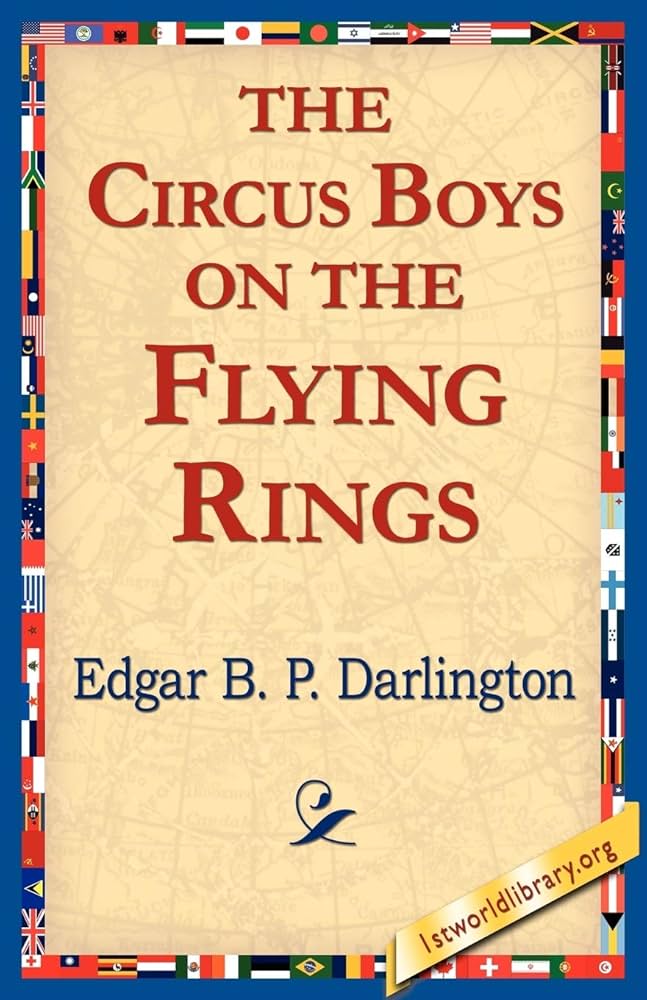Chapter IV — The circus boys on the flying Rings
byChapter IV begins with the arrival of the Sparling Combined Shows in Edmeston, casting a sense of wonder over the quiet town. Phil and Teddy, perched on Widow Cahill’s fence, watch in silent amazement as a parade of circus wagons rolls by, stirring the morning stillness. A sight rarely seen, the road-traveling circus boasts a collection of twenty-five decorated wagons, each carrying the essence of performance and adventure. Phil’s heart races as he spots towering elephants, the silhouette of a camel, and the rhythmic movement of ponies marching in unison. The scene is both surreal and electric, igniting in them dreams of joining the show. It’s not just the grandeur that captures their imagination, but the mechanics behind it—the people, the work, the magic that unfolds before the first spotlight hits the ring. From that moment, the idea of becoming a showman transforms from fantasy into a genuine pursuit.
Eager not to miss a moment, the boys tail the caravan toward the circus grounds, taking in the excitement of workers hammering stakes and mapping out tent positions. The organized chaos fascinates them, especially when they spot Rodney Palmer, a performer known for his skills on the flying rings. Rodney, approachable and spirited, shares his own experience and even offers advice on how Phil might earn a ticket—through service, not money. Inspired, Phil and Teddy volunteer to assist wherever needed, using enthusiasm as their only currency. In this exchange, the tent-raising becomes more than a spectacle; it becomes an opportunity. As they help lift canvas and haul ropes, the boys feel the weight of circus life in their hands—gritty, exhausting, but real. Their decision to immerse themselves signals a pivotal shift: they’re no longer just spectators.
Their moment of truth arrives unexpectedly. A wagon carrying a caged lion teeters dangerously as it attempts a tight turn across uneven ground. Workers shout. Panic flares. But Phil reacts. Sensing danger, he pushes against the back corner of the wagon, using all his strength to stabilize it just long enough for others to intervene. His action, unplanned and instinctual, draws immediate attention—not just from Teddy or Rodney, but from the owner himself, Mr. James Sparling. Sparling, known for his discerning eye, watches as the young boy prioritizes safety over fear, showing initiative without waiting for orders. His thanks come not in long speeches but in gestures that matter: two complimentary passes to the afternoon show. Phil’s pride, however, isn’t in the reward, but in the acknowledgment.
In circus culture, every act of courage—no matter how small—carries weight. What Phil did wasn’t just helpful; it aligned with the very ethos of circus life: act swiftly, protect your own, and never let fear paralyze you. Teddy, though slightly more inclined to jest than heroics, basks in the reflected glory and excitement. They may still be outsiders in terms of title, but among performers, respect is earned by actions, not names. That morning’s event elevates them. Not as full members yet, but as boys with potential. As they walk the grounds again, everything feels a bit more personal—the scent of sawdust, the hum of the calliope, even the low rumble of caged cats readying for showtime.
Rodney reappears and leads them through a different part of the lot—closer to the performer tents and practice spaces. Here, they see the human side of the circus. Men and women stretch, polish props, review cues, and laugh over shared meals. One aerialist bandages her wrist while another tightens the leather on his balancing pole. Phil notices how little glamor exists in these behind-the-scenes moments, yet how much passion pulses through each person’s routine. These aren’t just performers—they are craftsmen, athletes, and storytellers rolled into one. It reminds Phil that the circus isn’t built in a day. It’s a life, chosen and lived through grit and grace.
As noon approaches and the sun reaches its peak, the boys return to Widow Cahill’s to share the news. She listens, half-worried, half-wonderstruck, and sends them off with a reminder to be careful and grateful. When they leave again, dressed in their best, tickets in hand, they know they’re walking into more than a show—they’re stepping into possibility. In the grandstand that afternoon, with cotton candy in hand and hearts pounding, they won’t just see lions and tightrope walkers. They’ll see themselves—hopeful, brave, and slowly becoming part of something larger than they ever imagined.

